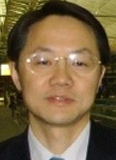
Speakers of ISCCN 2023

Prof. Lin Wang
Xiamen University, China
Personal Web Sites: https://wwcs.xmu.edu.cn/#/tutor?tutor_id=wanglin
Speech Title: Robust MDCSK Transmission Performances over Non-Stationary Channels
Abstract: For the future networks, esp. Internet of Things (loT) there is obvious demand about low power, low cost, and low delay for the connectivity chips. Meanwhile the nonstationary transmission properties need to be considered over the harsh environments, such as PLC and underwater acoustic channels. Not only the single chip design methodologies integrating different function chips together but also new signal design technique with strong against interferes over non-standard or nonstationary channels will become popular in the future networks. As one of these cases, joint spreading spectrum and modulations, DCSK has been confirmed to achieve remarkable advantages under the non-standard or nonstationary channels since it owns stronger against interferes and simple implementation complexity. The talk will show you how Mary DCSK (MDCSK) systems and their Coded Modulation Schemes ( BICM modes) are designed and analyzed over nonstationary channels, particularly over underwater acoustic communications and PLC. It has been found that the superiorities (low power, low cost, high robustness, etc) of proposed systems are evident over traditional counterpart over harsh transmission environments.

Prof. Xiaogang Liu
Wuhan University of Technology, China
Personal Web Sites: http://smee.whut.edu.cn/rsgz/szdw/201510/t20151014_200317.shtml
Speech Title: Prediction and Control of Wheel Squeal
Experience: Prof. Xiaogang Liu acquired his Ph.D. degree in mechanical engineering from the University of Queensland, Australia, and he is now the doctoral supervisor of Mechanical engineering and Instrument Science and Technology at the School of Mechanical and Electrical Engineering, Wuhan University of Technology. He has chaired two scientific research projects supported by the National Natural Science Foundation of China, and his academic outputs include academic papers, invention patents and software copyrights in the fields of Intelligent Manufacturing, Contact Mechanics, Mechanical Vibration and Electromechanical Control. As the leader of a provincial teaching and research project about mechanical manufacturing, he summarised these academic outputs into monographs to integrate research and education, and was recognized as Fellow of Higher Education Academy (FHEA). Currently, he is an assessment expert of the national Natural Science Foundation of China, an assessment expert of China Scholarship Council, a senior member of the Chinese Mechanical Engineering Society, an expert of the high-tech industry in Wuhan, and was awarded the “T A Stewart-Dyer Prize/Frederick Harvey Trevithick Prize” by the Institution of Mechanical Engineers in London.

Prof. Chenqiang Gao
Chongqing University of Posts and Telecommunications
Personal Web Sites: https://faculty.cqupt.edu.cn/gaocq/zh_CN/index.htm
Speech Title: SS3D: Sparsely-Supervised 3D Object Detection from Point Cloud
Abstract: Conventional deep learning based methods for 3D object detection require a large amount of 3D bounding box annotations for training, which is expensive to obtain in practice. Sparsely annotated object detection, which can largely reduce the annotations, is very challenging since the missingannotated instances would be regarded as the background during training. In this talk,I will introduce a sparselysupervised 3D object detection method, named SS3D. Aiming to eliminate the negative supervision caused by the missing annotations, we design a missing-annotated instance mining module with strict filtering strategies to mine positive instances. In the meantime, we design a reliable background mining module and a point cloud filling data augmentation strategy to generate the confident data for iteratively learning with reliable supervision. The proposed SS3D is a general framework that can be used to learn any modern 3D object detector. Extensive experiments on the KITTI dataset reveal that on different 3D detectors, the proposed SS3D framework with only 20% annotations required can achieve on-par performance comparing to fullysupervised methods. Comparing with the state-of-the-art semi-supervised 3D objection detection on KITTI, our SS3D improves the benchmarks by significant margins under the same annotation workload. Moreover, our SS3D also outperforms the state-of-the-art weakly-supervised method by remarkable margins, highlighting its effectiveness.

Prof. Wenqiang Jin
Hunan University, China
Personal Web Sites: http://csee.hnu.edu.cn/people/jinwenqiang
Speech Title: Emerging Threats Against Sensors
Abstract:
The development of sensor technology has pushed the society into the era of Internet of Everything. However, we are also facing emerging treats against the IoT system's sensors, which unavoidably impacts the system integrity and leads to severe privacy leakages. This talk mainly discuss the sensor security of generalized IoT systems. I will briefly introduce the threat models proposed in the recent years and provide the audience with an overview of the key technologies attacking against the sensors.
